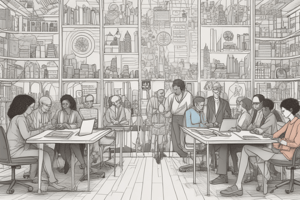Podcast
Questions and Answers
What is a primary challenge in addressing bias in the workplace despite federal laws?
What is a primary challenge in addressing bias in the workplace despite federal laws?
Bias is often subtle and pervasive.
What are the potential consequences of workplace bias for targeted individuals?
What are the potential consequences of workplace bias for targeted individuals?
Negative consequences can include decreased morale, productivity, and job satisfaction.
Why might federal laws alone not be sufficient to eliminate bias in workplaces?
Why might federal laws alone not be sufficient to eliminate bias in workplaces?
Because bias can be ingrained in workplace culture and behaviors, beyond legal frameworks.
In what ways can bias be characterized in a workplace setting?
In what ways can bias be characterized in a workplace setting?
What impact does pervasive bias have on the workplace environment?
What impact does pervasive bias have on the workplace environment?
What is the primary purpose of Title VII of the Civil Rights Act?
What is the primary purpose of Title VII of the Civil Rights Act?
In what areas does the ADA primarily prohibit discrimination against employees?
In what areas does the ADA primarily prohibit discrimination against employees?
What are 'reasonable accommodations' as required by the ADA?
What are 'reasonable accommodations' as required by the ADA?
How does the Americans with Disabilities Act (ADA) support disabled workers in the workplace?
How does the Americans with Disabilities Act (ADA) support disabled workers in the workplace?
Why is it important for employers to comply with Title VII and the ADA?
Why is it important for employers to comply with Title VII and the ADA?
Flashcards are hidden until you start studying
Study Notes
Workplace Bias Overview
- Federal laws exist to combat unfair treatment in the workplace, aimed at promoting equality.
- Despite legal frameworks, bias remains widespread and deeply entrenched in workplace cultures.
- Bias can be subtle, making it difficult to identify and address effectively.
- Individuals who experience bias are often subjected to significant negative impacts on their careers and well-being.
Consequences of Bias
- Targeted individuals may face reduced job satisfaction and increased stress levels.
- Bias can lead to diminished opportunities for career advancement and professional development.
- Affected employees may experience feelings of isolation, discouragement, and decreased motivation.
- Long-term exposure to bias can contribute to systemic inequities in workplace demographics and performance outcomes.
Title VII of the Civil Rights Act
- Prohibits employment discrimination based on race, color, religion, sex, or national origin.
- Applies to employers with 15 or more employees, including private and public sectors.
- Aims to promote equality in the workplace and protect workers’ rights.
Americans with Disabilities Act (ADA)
- Enacted in 1990, focuses on preventing discrimination against individuals with disabilities in various sectors.
- Mandates that employers provide reasonable accommodations to enable disabled workers to perform their jobs effectively.
- "Reasonable accommodations" may include modified work schedules, accessible workspaces, or assistive technologies.
Key Protections for Disabled Workers
- Protects workers from being discriminated against because of their disabilities, ensuring equal opportunity in hiring, promotion, and job benefits.
- Requires employers to engage in an interactive process to identify and implement necessary accommodations.
- Strengthens the rights of disabled individuals, encouraging inclusion and diversity in the workforce.
Studying That Suits You
Use AI to generate personalized quizzes and flashcards to suit your learning preferences.




